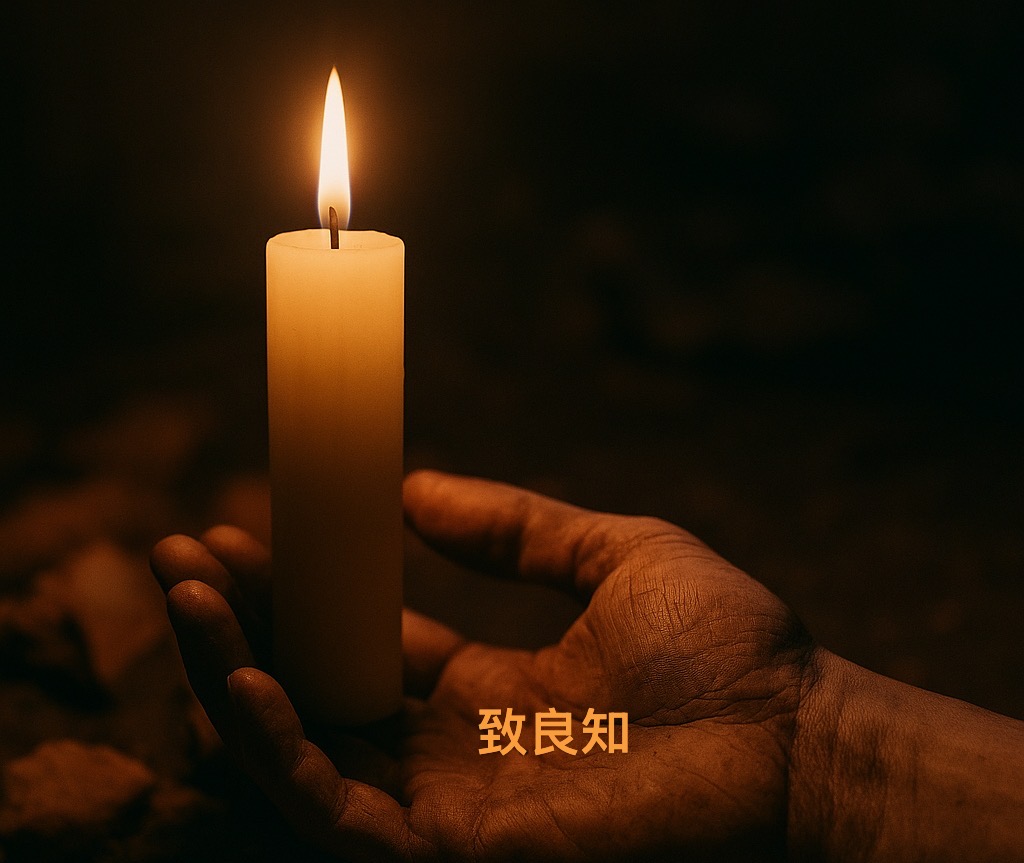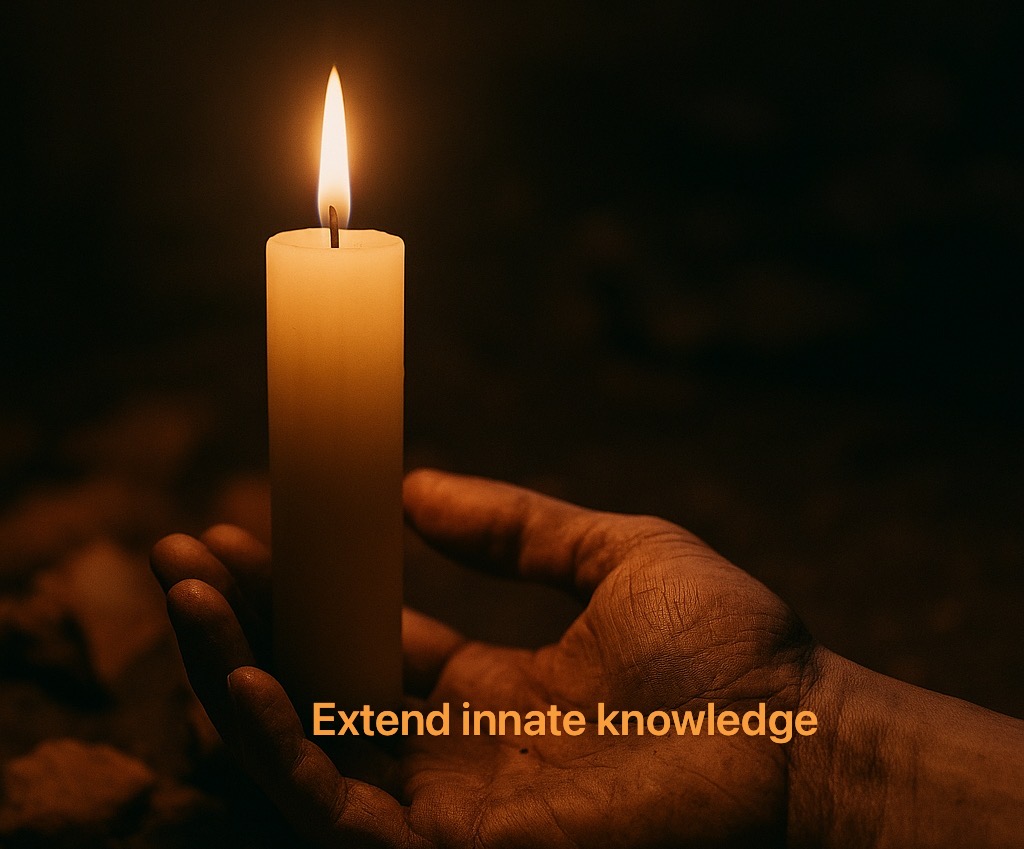——我们披上了人皮后,读书学习到底为了什么?
文 / HuSir
在儒家思想的发展史中,王阳明的“心学”堪称一个重要转折点。他不再强调外在经典或权威,而是回到人自身,主张“心即理”,提出那句千古名言:“致良知”。
什么是“致良知”?
“良知”是每个人与生俱来的道德直觉。它不是从书上学来的,也不是由别人告知的,而是当我们面对对错、善恶时,内心自然生出的判断力。
“致良知”,就是将这份天赋的判断不断地唤醒、实践。王阳明强调:“知善知恶是良知,为善去恶是格物。”换句话说,我们不但要知道什么是对的,还要去做那个对的选择。
但在后世,“致良知”逐渐成了口号,而不是行动。尤其在一些关键历史节点上,“良知”不是失传了,而是被训练成了沉默。

在中国文化的深处,曾有一种信念,它不依赖君王、不取决于权威、不来自诏令,而是源自每个人内心深处的一点光。这种信念,王阳明称之为“良知”。
阳明说:“知善知恶是良知,为善去恶是格物。”这句话的分量,不在于哲学术语,而在于它指出了一个根本事实:人是可以知道对错的,而这判断,不是外来的,是从心里升起来的。
然而今日,在我们的民族共同体中,“知善知恶”似乎变得越来越遥远。我们越来越少听到“这是错的”“这不该发生”,越来越多地听到“别问”“别说”“你这样会害了自己”。
这不是一个理性判断能力的退化,而是一场历时数十年的系统性训练——训练我们如何违心活着,如何背过脸去对待身边的苦难。
一、当“知”与“行”被强行撕裂
阳明强调“知行合一”。他说,如果一个人知道这是错的,却仍然去做,那他其实从未真正“知道”。
但在今日的现实中,我们却被不断地告诫:“知道归知道,做事要看大局。”于是,“知道”的人越来越多,“敢做”的人越来越少;“沉默的智者”遍地都是,“忠诚的愚人”成了榜样。
有一天我读到一位朋友的留言,他说:“我们已经习惯了,不为眼前的哭声动心,也不为路边倒下的人驻足,因为我们都被教育过——发声是危险的。”
这句话让我久久不能释怀。
不是没有良知,而是被长期教会了“良知必须静音”。
二、那一夜之后,我们失去的不是胜利,而是信任
在很多年以前,一个风起云涌的季节里,曾有一群年轻人,他们举着写满希望的标语,在都市的心脏地带,唱着歌,谈论宪政、呼喊自由。他们不持刀、不握枪,只是用身体、用声音、用热泪,向这个国家最深的黑夜说:“我们还相信光。”
后来,在一个我们不敢明说的夜晚,那些声音被撕裂,那些身体被掩埋,那些记忆被封锁。
但最严重的,不是枪响,不是死亡,而是我们这个民族从那一夜开始,被系统地教会:不要去相信“善”的可能。
父母开始对孩子说:“不要管太多。”
老师教学生:“聪明人不谈敏感事。”
甚至教会也有人说:“属灵人不谈这些。”
那不是宗教的教义,那是恐惧的代名词。
三、从“致良知”到“致沉默”
王阳明说,致良知,就是要不断实践内心那个告诉你“这是对”“那是错”的声音。但我们今日所见到的,是一种集体性的“致沉默”:
- 不该被打的人被打了——“他自己也不干净”;
- 不该被封的信息被封了——“国家自有安排”;
- 不该被冤的冤了——“我们也无能为力”……
于是,良知不再是行动的源泉,只是微信朋友圈中偶尔转发的一句鸡汤,然后被迅速删除。
良知,被我们裹上了棉布、浸在麻醉液中,活着,却沉睡。
四、基督徒的火种:你不能只悄悄祷告
圣经说:“你们是世上的光,城造在山上是不能隐藏的。”(太5:14)
可我们却常常听见信徒说:“这些不属灵,我们只谈耶稣。”
可耶稣是谁?
是那位面对不义政权时说“你说的是”的主,
是那位走进圣殿掀翻权贵桌子的主,
是那位为真理受难的主。
如果耶稣为真理流血,我们怎能因怕麻烦而闭口?
这并不是说我们每个人都要变成社会活动家、街头演说者,而是说:我们至少,不能把“这是错的”这四个字,永远锁在心里。
五、你仍然可以“致良知”
致良知,不是一场革命,也不是一份宣言,而是一种坚持:
- 看见一件不义的事,不嘲笑,不转头,而是心中有刺;
- 听见一个受难者的故事,不说“与我无关”,而是默默为他祷告,或者留言,或者不点赞也不删帖;
- 在合适的时机,说出“我不同意这样”,哪怕只是私下告诉一个朋友。
这就是火种。火种虽小,但黑夜中,只要有一点火,就不是全然的暗。
尾声:致那些沉默的瓦砾之下
当年倒下的人,他们没有死在肉体上,而是被埋在一代代的沉默与否认中。而我们这代人,若还想做一个有灵魂的中国人,哪怕无法改写历史,也要在记忆中,保守那一点点未被污染的善恶之心。
阳明说:“良知如镜,遮之则暗。”
我祈祷,今天的我们,哪怕活在仍旧压抑的环境中,也不要用自己的手,为这个世界拉下最后那块帘布。
愿我们活着,不仅仅为了自己不被打扰,更为了——
有朝一日,当孩子问我们“那时候你在做什么”,
我们可以平静地说:“我没有忘。”,我仍然有良知,我做了我该做的。
Do We Still Remember “Right and Wrong” in the Silence of Conscience?
— Having donned our human skins, what ultimately is the purpose of our reading and learning?
By HuSir
In the history of Confucian thought, Wang Yangming’s School of Mind represents a profound turning point. He no longer emphasized external classics or authority, but turned inward, asserting that “the mind itself is principle” and coining the timeless phrase, “Extend (or manifest) innate knowledge” (致良知).
What Is “Extending Innate Knowledge”?
“Innate knowledge” (良知) is the moral intuition every person is born with. It isn’t learned from books, nor taught by others; it naturally arises in our hearts when we confront right and wrong.
To “extend innate knowledge” means to continually awaken and practice this God-given moral faculty. As Wang Yangming put it:
“Knowing good and evil is innate knowledge; doing good and removing evil is the investigation of things.”
In other words, we must not only understand what is right but also act on that understanding.
Yet over the centuries, “extending innate knowledge” has become a slogan rather than a lived practice. Especially at certain pivotal moments in our shared history, this innate moral compass wasn’t lost so much as trained into silence.

Deep in the core of Chinese culture once lay a conviction that depended on neither emperor nor external decree but on that spark of light within each person’s heart. Wang Yangming called this spark “innate knowledge.” He taught:
“Knowing good and evil is innate knowledge; doing good and removing evil is the investigation of things.”
These words aren’t mere technical jargon; they point to a fundamental truth: we can all discern right from wrong, and that judgement comes from within.
Yet today, within our national community, discerning good and evil seems ever more distant. We hear far less often “This is wrong,”“This should not happen,” and far more often “Don’t ask,”“Don’t speak,”“You’ll get into trouble.”
This isn’t a decline of rational judgement but a systematic training over decades—training us how to live against our own conscience, how to turn away from the suffering at our feet.
I. When “Knowing” and “Doing” Are Torn Apart
Wang Yangming insisted on “Unity of Knowledge and Action.” He wrote:
“Knowledge is the beginning of action; action is the completion of knowledge.”
But in today’s reality, we instead hear: “Know all you want—but when it comes to action, you must consider the bigger picture.”
So the number of people who know how to distinguish right from wrong grows, while the number who dare to actdwindles. Silent sages abound; loyal fools become exemplars.
A friend once wrote in a message:
“We’ve grown accustomed to not being moved by cries in the streets, not pausing for those who fall by the roadside—because we’ve been taught: speaking out is dangerous.”
That sentence haunts me still.
It’s not that conscience has vanished, but that we’ve long been taught “Conscience must stay silent.”
II. After That Night, We Lost Not Victory but Trust
Many years ago, in a season of stirring winds, a group of young people marched into the heart of the city, waving hopeful banners. They sang songs and spoke of justice and freedom—unchained by weapons, armed only with their voices and tears. They told the darkness, “We still believe in light.”
Then, on a night we dare not name, those voices were torn apart, those bodies buried, those memories sealed away.
But the greatest tragedy wasn’t the gunfire or the deaths, but that from that night on, our nation was taught—do not believe in the possibility of good.
Parents told children: “Don’t worry about it.”
Teachers warned students: “Smart people don’t discuss sensitive matters.”
Even believers whispered: “Spiritual people don’t speak of these things.”
That wasn’t doctrine; it was fear made flesh.
III. From “Extending Innate Knowledge” to “Extending Silence”
Wang Yangming said extending innate knowledge is the continual practice of our inner voice telling us “This is right,”“That is wrong.”
Yet today we see an institutionalized “extension of silence”:
- Those who should never have been struck were struck—“They were not pure themselves.”
- Information that should never have been blocked was blocked—“The state has its own reasons.”
- Those wrongfully accused remain so—“There is nothing we can do.”
Thus, conscience ceases to be a spring of action and becomes an occasional “inspirational quote” forwarded in chat groups—only to be swiftly deleted. Conscience is wrapped in cotton, submerged in anesthetic—alive, but asleep.
IV. The Christian’s Spark: We Cannot Only Whisper Prayers
Jesus said:
“You are the light of the world… A city set on a hill cannot be hidden.” (Matt 5:14)
Yet we often hear fellow believers say, “That’s not spiritual—we only speak of Christ.”
But who was Christ?
- He who faced unlawful power and calmly said, “Speak your mind.”
- He who overturned the tables of the money-changers in the temple.
- He who died for truth.
If Jesus shed blood for truth, how can we hide our mouths for fear of trouble?
This is not a call for revolution or public protest. It’s a reminder that we cannot lock the words “This is wrong” forever in our hearts.
V. You Can Still “Extend Innate Knowledge”
Extending innate knowledge is not a revolution or a manifesto; it is a practice of small, persistent acts:
- When you witness an injustice, do not mock it or turn away—let it prick your heart.
- When you hear a suffering soul’s story, do not say “Not my concern”—pray for them, leave a quiet comment, refrain from liking but don’t delete.
- At the right moment, quietly tell a friend, “I cannot agree to this.”
This is the spark. A spark may be small, but in the dark, even a tiny flame dispels much of the gloom.
Epilogue: To Those Buried Beneath Silent Rubble
Those who fell that night did not die only in body—they were buried beneath generations of silence and denial.
We who remain aspire to be soulful Chinese—though we cannot rewrite history, we can preserve, in our memory, that untainted glimmer of right and wrong.
Wang Yangming taught: “Conscience is like a mirror—if you cover it, it grows dark.”
I pray that today—even in an environment still stifling—we will not use our own hands to draw down the final drape on this world.
May we live not merely to avoid disturbance, but so that, one day when a child asks,“What were you doing then?”
We can answer with calm in our hearts:
“I did not forget. My conscience remained awake, and I did what I could.”

发表回复